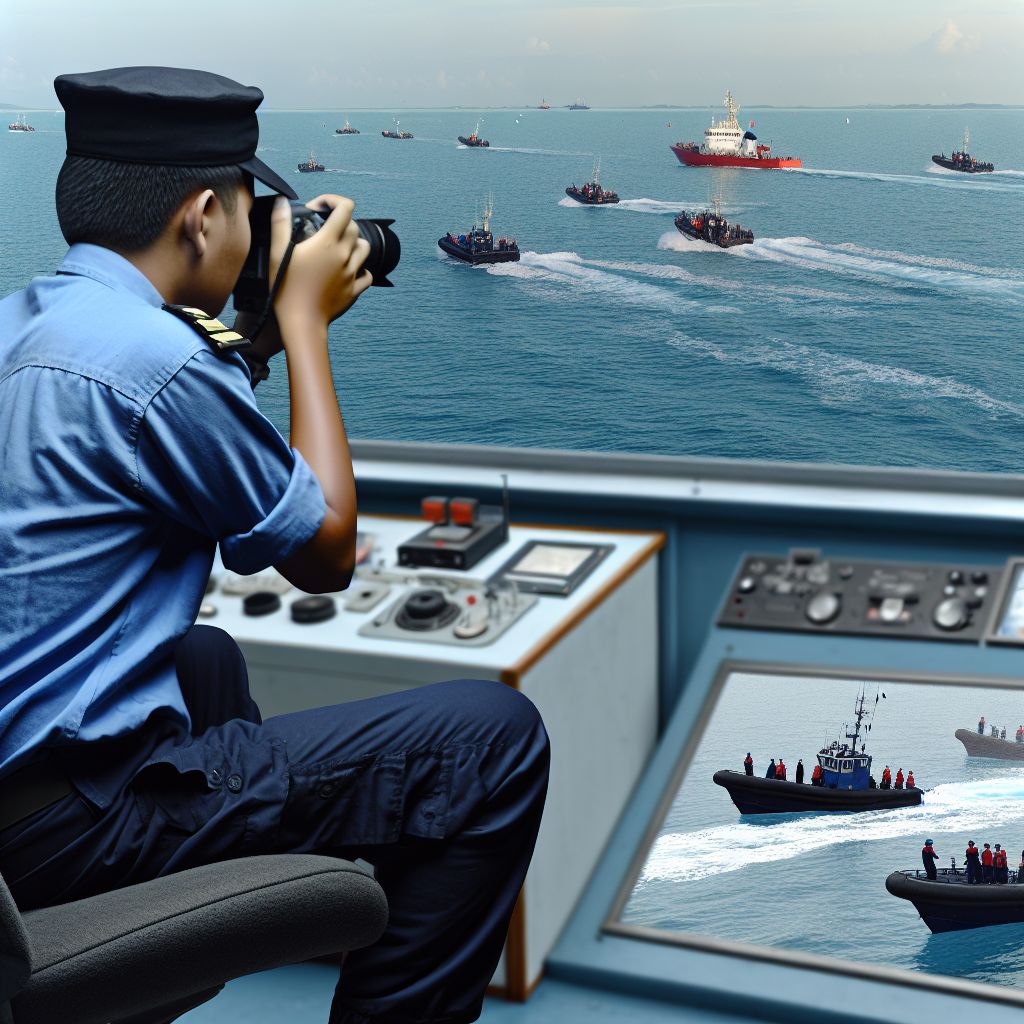Deutsch: Verfolgung / Español: Seguimiento / Português: Rastreamento / Français: Suivi / Italiano: Tracciamento
Tracking in the maritime context refers to the process of monitoring and recording the movements and positions of ships and other watercraft as they navigate through bodies of water. This typically involves the use of various technologies such as the Automatic Identification System (AIS), radar, satellite communication, and GPS (Global Positioning System).
Description

Tracking allows for safe navigation by providing real-Time data on the positions of nearby vessels, navigational hazards, and environmental conditions. It supports shipping companies and maritime operators in managing their fleets by supplying information on the location, speed, and heading of their ships. Furthermore, it contributes to maritime security by enabling authorities to Monitor ship traffic, identify unusual activities, and enforce maritime boundaries and regulations.
Application Areas
- Navigation and Safety: Enhancing safety in ship navigation.
- Fleet Management: Optimizing operational efficiency and fuel usage.
- Security and Surveillance: Assisting in enforcing maritime boundaries and regulations.
- Search and Rescue Operations: Increasing the effectiveness of search and rescue efforts.
- Logistics and Supply Chain Management: Improving the reliability of shipping schedules and managing global supply chains.
Well-Known Examples
The use of the Automatic Identification System (AIS) to track ship movements is a prominent example of tracking in the maritime sphere. It allows for near-continuous monitoring of ships on the high seas and in coastal areas.
Weblinks
- finanzen-lexikon.de: 'Tracking' in the finanzen-lexikon.de (German)
- allerwelt-lexikon.de: 'Tracking' in the allerwelt-lexikon.de (German)
- environment-database.eu: 'Tracking' in the glossary of the environment-database.eu
- top500.de: 'Tracking' in the glossary of the top500.de
- information-lexikon.de: 'Tracking' in the information-lexikon.de (German)
- psychology-lexicon.com: 'Tracking' in the psychology-lexicon.com
- kriminal-lexikon.de: 'Verfolgung' in the kriminal-lexikon.de (German)
Summary
Tracking in the maritime context is a crucial Component of the global maritime industry, enhancing Navigational safety, operational efficiency, and security on the world's oceans and waterways. By providing accurate and timely information on the position of vessels, tracking supports the maritime industry in meeting its diverse requirements and challenges.
--
Related Articles to the term 'Tracking' | |
| 'Maritime Traffic Management' | ■■■■■■■■■■ |
| Maritime Traffic Management is a crucial aspect of ensuring the safe and efficient movement of vessels . . . Read More | |
| 'Position' | ■■■■■■■■■■ |
| In the maritime context, \'position\' refers to the specific location of a ship or any other maritime . . . Read More | |
| 'Navigation and Communication' | ■■■■■■■■■■ |
| Navigation and Communication in the maritime context refer to the systems, technologies, and processes . . . Read More | |
| 'Information System' | ■■■■■■■■■■ |
| Information System: Information system in the maritime context refers to the digital and electronic platforms, . . . Read More | |
| 'Radar' | ■■■■■■■■■ |
| Radar in the maritime context refers to a system that uses radio waves to detect and locate objects, . . . Read More | |
| 'Appliance' | ■■■■■■■■■ |
| Appliance in the maritime context refers to any device or equipment installed on a ship or used in maritime . . . Read More | |
| 'Technology' | ■■■■■■■■ |
| Technology in the maritime context refers to the application of scientific knowledge, engineering, and . . . Read More | |
| 'Real time' | ■■■■■■■■ |
| Real time in the maritime context refers to the immediate or near-instantaneous processing, transmission, . . . Read More | |
| 'Real-time monitoring' | ■■■■■■■■ |
| Real-time monitoring in maritime contexts refers to the continuous, instantaneous tracking of vessels, . . . Read More | |
| 'Marine Navigation' | ■■■■■■■■ |
| Marine Navigation refers to the Process of planning, directing, and controlling the Movement of Vessels . . . Read More | |